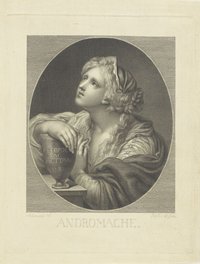
"In Greek mythology, Andromache (/ænˈdrɒməkiː/; Ancient Greek: Ἀνδρομάχη, Andromákhē [andromákʰɛ:]) was the wife of Hector, daughter of Eetion, and sister to Podes. She was born and raised in the city of Cilician Thebe, over which her father ruled. The name means "man battler" or "fighter of men" or "man fighter" (note that there was also a famous Amazon warrior named "Andromache", probably in this meaning) or "man's battle" (i.e. "courage" or "manly virtue"), from the Greek stem ἀνδρ- "man" and μάχη "battle".
During the Trojan War, after Hector was killed by Achilles and the city taken by the Greeks, the Greek herald Talthybius informed her of the plan to kill Astyanax, her son by Hector, by throwing him from the city walls. This act was carried out by Neoptolemus who then took Andromache as a concubine and Hector's brother, Helenus, as a slave. By Neoptolemus, she was the mother of Molossus, and according to Pausanias, of Pielus and Pergamus. When Neoptolemus died, Andromache married Helenus and became Queen of Epirus. Pausanias also implies that Helenus' son, Cestrinus, was by Andromache. In Epirus Andromache faithfully continued to make offerings at Hector’s cenotaph. Andromache eventually went to live with her youngest son, Pergamus in Pergamum, where she died of old age. Andromache was famous for her fidelity and virtue; her character represents the suffering of Trojan women during war." - (en.wikipedia.org 10.08.2021)


![[Hektor's Abschied]](/data/nds/resources/images/202009/200w_000001-5f587cb5145f9.jpg)

